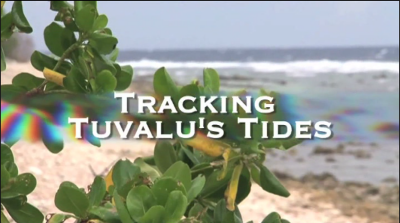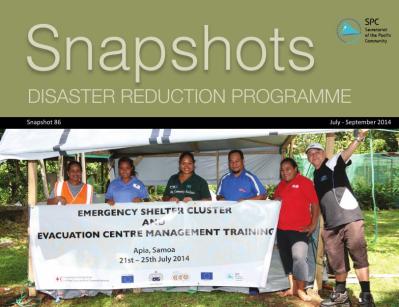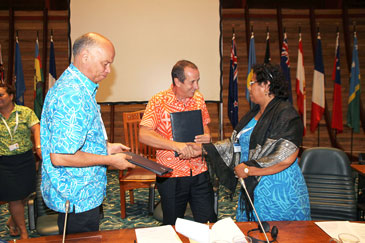SPC Highlights Technology and the Positive Advances Facing Pacific Regional Development at the GIS and Remote Sensing Conference
Thursday, 27 November 2014 11:21
administrator

Thursday 27 November 2014, Secretariat of the Pacific Community (SPC) Suva, Fiji - The Pacific region continues to face development issues and technology of all kinds is assisting many areas of decision making, wealth generation and job creation. This was the focus of opening remarks delivered by Professor Michael Petterson, Director of the Secretariat of the Pacific Community’s (SPC) Applied Geoscience and Technology Division (AGTD) at the Geographic Information System and Remote Sensing (GIS & RS) conference.
The GIS & RS conference opened on Tuesday, 25th November at the University of the South Pacific, Suva, Fiji with the theme “Empowering Pacific Communities through Improved Geospatial Data”, and where approximately 280 participants were in attendance with representatives from countries and agencies from the Pacific and beyond.
‘Although we have some way to go because of limited capacity and resources, organisations like SPC have made a solid start in developing modern databases, applying new technologies, including Unmanned Aerial Vehicles, multivariate satellite spectra and bathymetric instruments. These technologies allow for rapid coverage of land and lagoon, enabling experts to determine land use, forestry cover, areas of mineralisation, sites for geothermal energy and to assist with planning decisions,’ Petterson described.
Last Updated on Tuesday, 06 January 2015 05:18
Read more...
|
Regional discussion on Pacific Geographic Information System and Remote Sensing to begin next week
Friday, 21 November 2014 11:52
administrator

The annual Pacific Geographic Information System and Remote Sensing (GIS/RS) User Conference will be held from Tuesday 25 - 27 November, 2014 in Suva.
The Conference will be held at the Japan Pacific ICT Centre located at the University of the South Pacific (USP), Laucala Campus and will be opened by the Permanent Secretary of Lands, Mr Tevita Boseiwaqa and the Secretariat of the Pacific Community’s (SPC) Applied Geoscience and Technology Division Director, Professor Michael Petterson.
The theme of the 2014 Conference is “Empowering Pacific Communities through Improved Geospatial Data” where more than 200 participants are expected to converge.
The three-day conference will include plenary presentations and technical sessions to address themes that include but are not limited to using GIS in forestry and landcover, coastal and marine, spatial open source data, disasters, geodetic infrastructure, utilities, and education with case studies from Pacific Island countries. The conference will also showcase the latest technology and applications on GIS presentations.
Dr Wolf Forstreuter, Head of SPC’s GIS/RS Unit commented that this is the only conference in the GIS & RS user community where Pacific Islanders have an opportunity to showcase their GIS & RS applications and meet representatives of spatial data resellers, software, hardware vendors, and scientific specialists. He added, ‘There are some regional conferences in Hawaii, New Zealand and Australia; however, the level of participation by representatives from the Pacific region is often limited at those meetings, as compared to the Suva conference.’
Last Updated on Friday, 21 November 2014 11:56
Read more...
Video: Tracking Tuvalu Tides
Thursday, 13 November 2014 12:50
administrator

The nation of Tuvalu is made up of nine low-lying islands scattered across the surface of the equatorial Pacific Ocean. These islands are home to over 11 thousand people and for them, the sea is a major source of food. However, the ebb and flow of the tides has also brought change to these islands.
The sea level monitoring station in Funafuti, the capital of Tuvalu, is one of 13 located throughout the Pacific region and undergoing maintenance. For the past 20 years it has been collecting and analysing vital data in tracking Tuvalu tides. These monitoring stations help to better predict and prepare for the extreme high tide which, in turn helps prevent great loss to personal property. Other vital services also depend on this important information e.g. infrastructure, large buildings etc.
The monitoring stations are part of the Australian Government- funded Pacific Sea Level Monitoring Project in partnership with the Australian Bureau of Meteorology’s Climate and Ocean Support Program, Geoscience Australia, Pacific Island Governments and the Secretariat of the Pacific Community’s Geoscience Division (GSD).
Click "Read More" below to watch video.
Last Updated on Thursday, 19 March 2015 13:06
Read more...
|
Snapshots 86: Disaster Reduction Programe: July - September 2014
Monday, 10 November 2014 14:16
administrator

From The Manager's Desk
How time flies! We’re well into October and yet it seems that just yesterday we were coming out of the Pacific Platform for DRM in June. Strange but true. The rigours of the work schedule causes one to lose track of time. Next thing you know Christmas will be upon us and we’ll have to close the book on yet another year.
We’ve been part of some exciting initiatives over the course of the last few months and are happy to share some of them with you in this edition of Snapshots. Since the last edition in June, our team at the SPC Disaster Reduction Programme has increased further with the addition of 3 staff for the Pacific Catastrophe Risk Assessment & Financing Initiative, Phase 3 project.
Amongst other activities, we’ve become the lead for a new programme of support for resilience building from the World Bank (more in future issues of Snapshots), have been progressing well in terms of the EU-funded Building Safety & Resilience in the Pacific project and helped to showcase the great work the region is doing on the integration of DRM and Climate Change at the SIDS conference held in September.
I hope you enjoy reading this edition. Stay tuned for more...just around the corner.
Read Online | Download (10Mb)
Mosese Sikivou
Deputy Director
Disaster Reduction Programme
Last Updated on Tuesday, 11 November 2014 09:18
Kiribati, the EU and SPC partner to ensure clean water and safe sanitation in atoll communities
Thursday, 06 November 2014 07:47
administrator

The European Union, the Secretariat of the Pacific Community (SPC) and the Government of Kiribati yesterday formalised a 3.3 Million Euro (4.75 Million AUD) partnership that is expected to increase access to safe water and sanitation in 35 villages in Kiribati's Gilbert Islands.
Funded by the European Union and to be implemented by SPC, the Water and Sanitation in Kiribati Outer Islands project will focus on improving water and sanitation infrastructure on the 16 islands of Kiribati's Gilbert group. It will also improve management of water and sanitation at the community level.
On signing the agreement, the EU’s Ambassador to the Pacific, Mr Andrew Jacobs highlighted the importance of effective partnerships to support local communities when pursuing development goals.
‘The European Union, SPC and Kiribati have forged a fruitful partnership over the years. This project is yet another example thereof. This project also reflects the EU's continued commitment to support the government of Kiribati and its people in their efforts to attain the Millennium Development Goals [MDGs], which are due for assessment in 2015,’ he said.
Last Updated on Tuesday, 11 November 2014 09:18
Read more...
|
|
|
|
|
|
Page 7 of 74 |

 News & Media Releases
News & Media Releases








